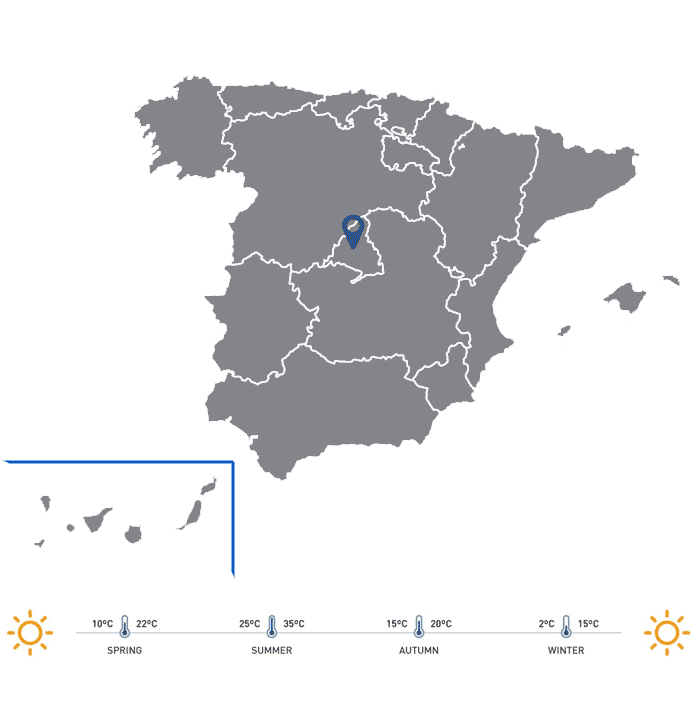
 System of Government:
System of Government:
Parliamentary Monarchy. Spain is divided into 17 autonomous communities and 2 autonomous cities. Each autonomous community is itself divided into provinces, totalling 50 in all.
 Religion:
Religion:
Spain is a non-confessional state in which all types of cultures and religions live together, with the Christians community being the majority.
 Idioms:
Idioms:
Castellano (Spanish) is the official language. Alongside it there exists various co-official languages. Euskera in the Basque Country, Gallego in Galicia, Catalan in Catalonia and Valenciano in the Valencian Community.
 Population:
Population:
47,42 million inhabitants. The most highly populated provincial capitals are Madrid, Barcelona, Valencia and Seville.
 Currency:
Currency:
Euro (€). Notes in circulation of 500, 200, 100, 50, 20, 10 and 5. There are eight different coins 1, 2, 5, 10, 20 and 50 cents, 1 and 2 euros. It is the official currency of the eurozone, which is formed of 19 of the 28 states of the European Union.
 Electricity:
Electricity:
Voltage of 230 volts and 50 hertz of alternative current. Plugs are with the system of rounds pins.
 Measurements:
Measurements:
Decimal metric system. Meter, Kilogram, Litre, Degrees Celsius.

Maybe the Spanish timetable is one of the things that most calls your attention, given that it is very different from other European countries.
Meal schedule:
Breakfast: 7.00 - 10.00 h
Lunch: 13.30 - 16.00 h
Dinner: 20.30 - 22.30 h.
Business hours: most of the shops are open from 10.00 to 14.00 h. and from 17.00 to 20.00 h. Monday to Saturday, although these times can be extended, especially in summer, staying open until 22.30 h. There are also shops open 24 hours. With regard to commercial centres, these are open from Monday to Saturday from 10.00 to 22.00. In the case of Madrid there are several shopping centres that open almost every day of the year.

Generally Spain is a completely safe country although it is recommended to have the usual precautions. Moreover, the country has a national health system which covers through public healthcare centres.
If you are from a country outside the European Union, Iceland, Liechtenstein, Norway or Switzerland, you need to process the European Health Insurance Card (EHIC) before your arrival. If you are from a country other than the above it is the best thing, before you come, check whether there is an agreement between your country and Spain on Social Security and health care. In the event that your country has not signed any agreement with Spain, remember that you have the obligation to take out private health insurance.
In any case, and the conditions may vary, we recommend that you inform yourself of the requirements in force that you must meet to receive health care in Spain.

Having a bank account will help you manage your money, to create direct debits for household bills such as rent, electricity, telephone, to receive and transfer money and to have a card that allows you to get money at the ATM network.
To open an account at a bank or a savings bank, you will have to justify if you are resident or non-resident.
If you are a resident of Spain, it is sufficient to submit the bank your NIE (Foreigner Identity Number) to open an account.
If you are not a resident, you have two options: apply directly to the Directorate General of Police for a certificate of non-resident and present it to the bank with your passport, or go directly to a bank with your passport and ask them to be the ones who you processed your certificate of non-resident later to open the account.

There are different options to take advantage of your student status and get discounts for numerous activities such as travel, restaurants, museums...
International Student Identity Card (ISIC). It works in more than 130 countries. Regardless of your age and the type of studies you are studying, you will be able to access exclusive discounts on trips, cultural activities, leisure... and many more offers. All this, for a price of €11 (online card) and with a duration of 12 months. All information here
European Youth Card holders. If your age is between 14 and 30 years, you can enjoy many benefits and discounts on various services. In the following website you can find all the information.
Card of the Spanish Network of Youth Hostels (RESET). It is an internationally recognized card and you can use it in many domestic and foreign shelters. More information: www.reaj.com
Spain is one of the most developed European countries so far as transport infrastructure is concerned, and its network of high-speed train having the most kilometres.

With an extensive network of airports the Madrid Barajas Adolfo Suárez airport stands out. It is the fifth in Europe in number of passengers and flights, being the main entrance for Latin America to Europe. Its runways connect the largest number of flights to and from this continent to the entire world.

There are different types of trains: suburban, middle distance, long distance and high-speed train (AVE) that allow you to visit all the regions of Spain. More information: www.renfe.com

You will find different city bus routes to reach different parts of the city and the country. In the case of Madrid see the following link: www.emtmadrid.es

The metro is usually the fastest transport to get around the city. In the following link you can see everything about the Metro de Madrid: www.metromadrid.es

All taxis have official rates, but may charge supplements for luggage, collection point, destination... Remember that you can demand that you are given a receipt. In addition, you can request a taxi from the mobile application MyTaxi, among others.
Copyright © 2026 Le Cordon Bleu International B.V. All Rights Reserved.